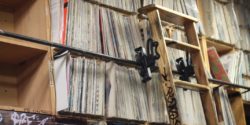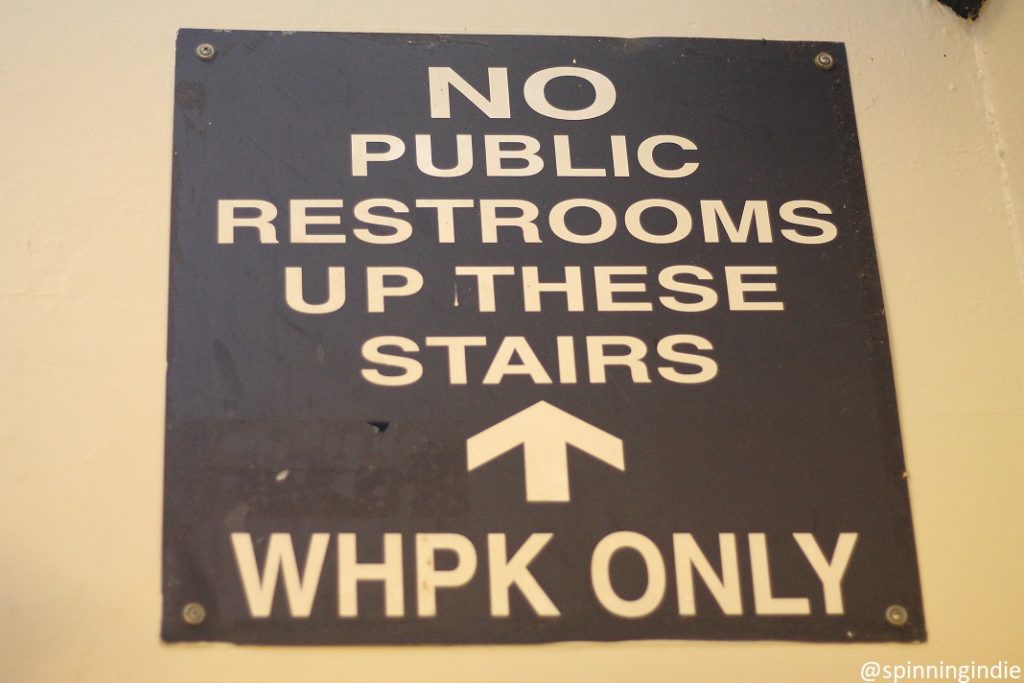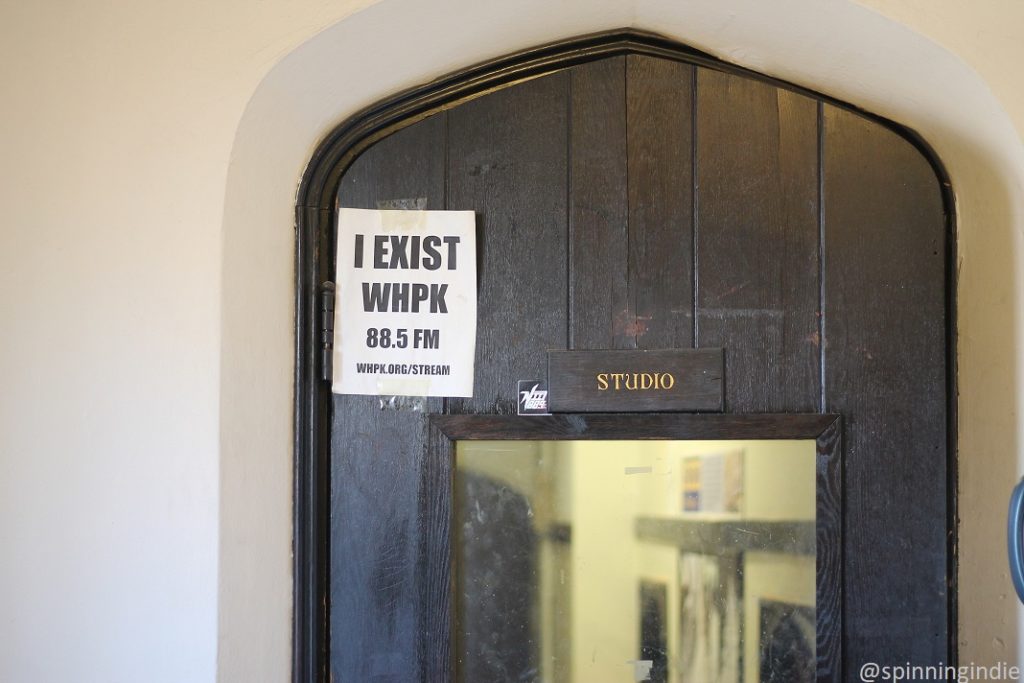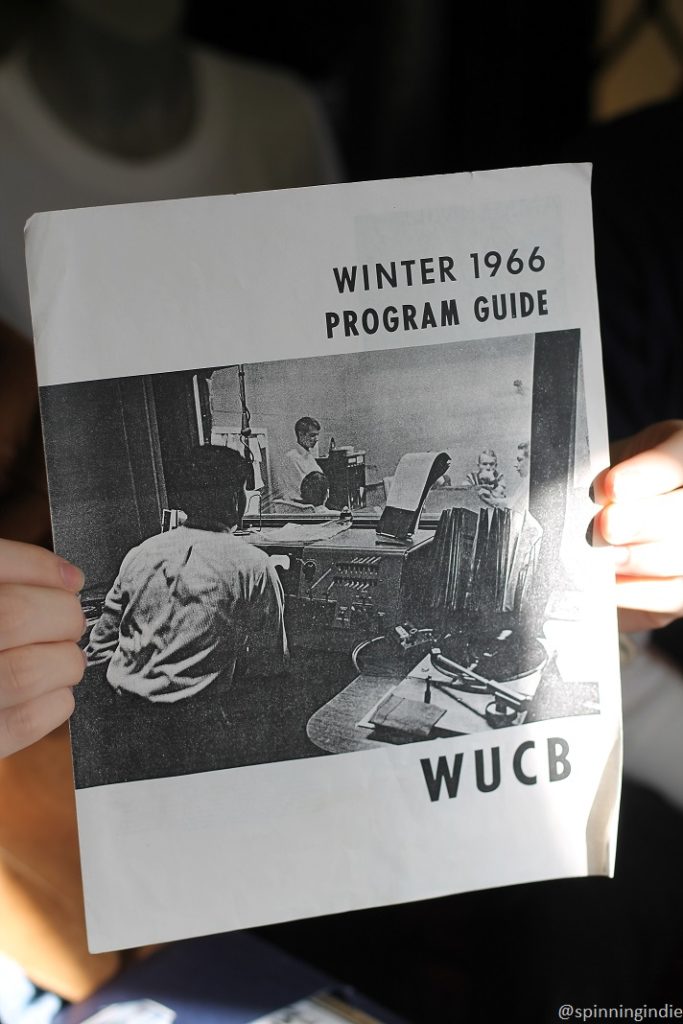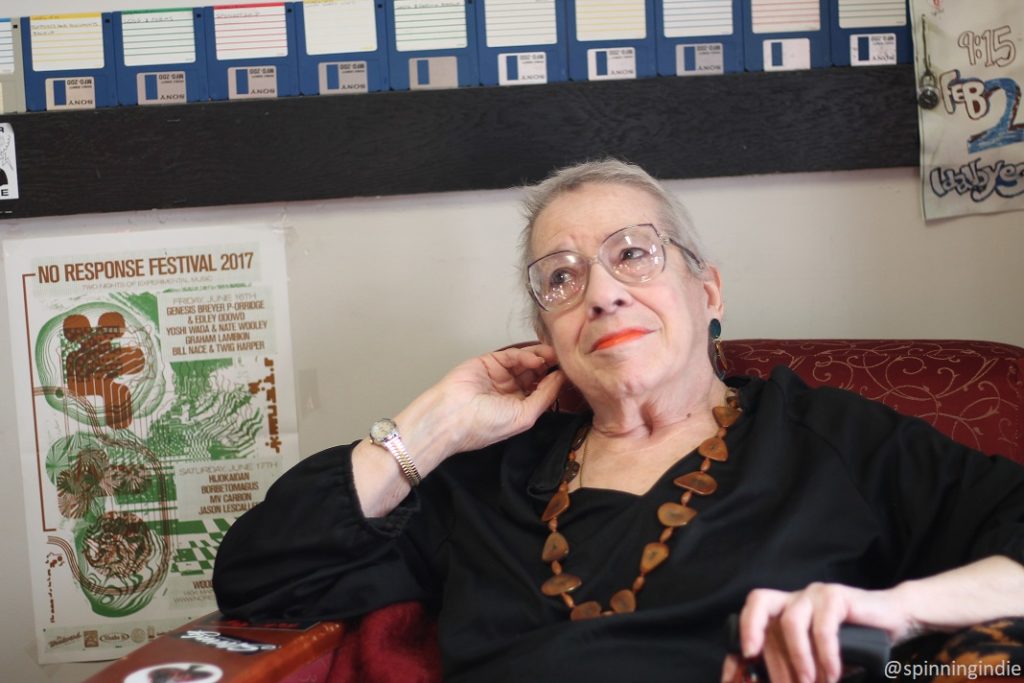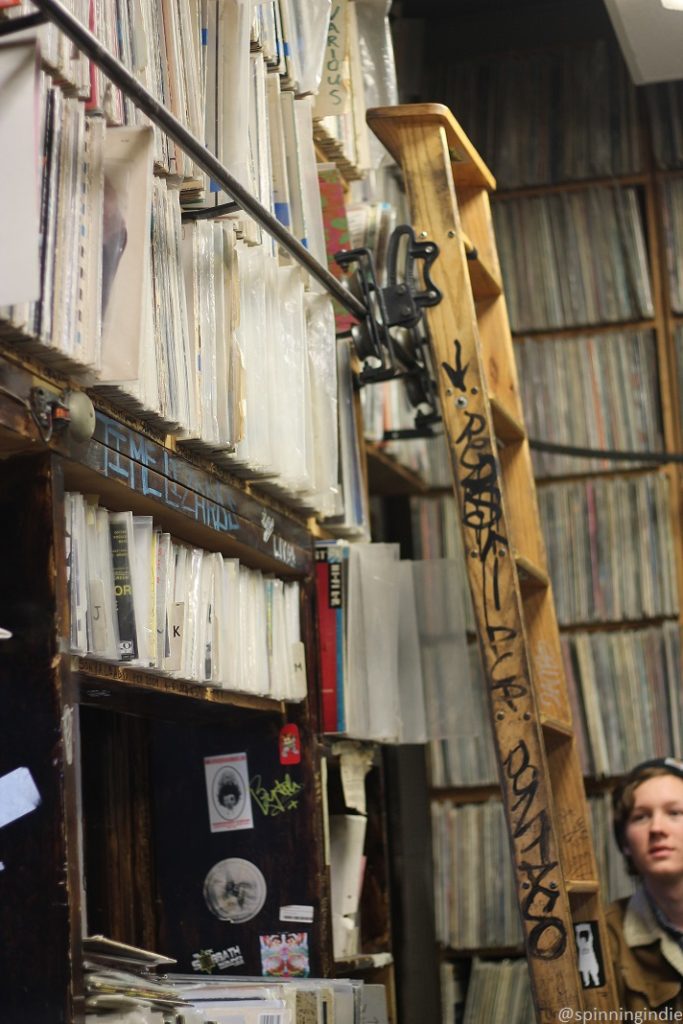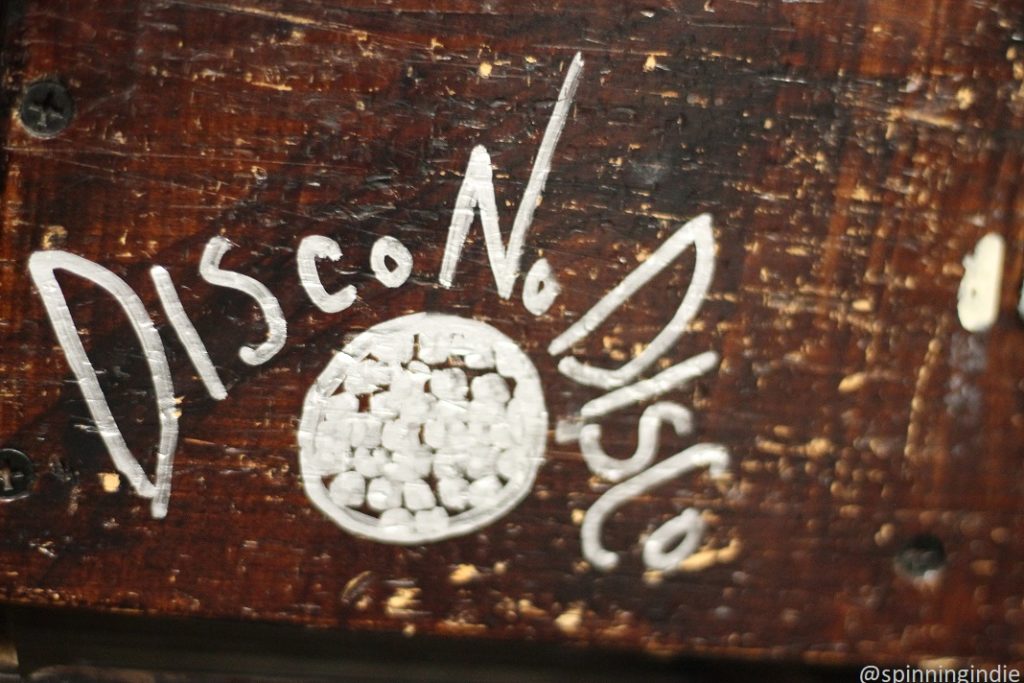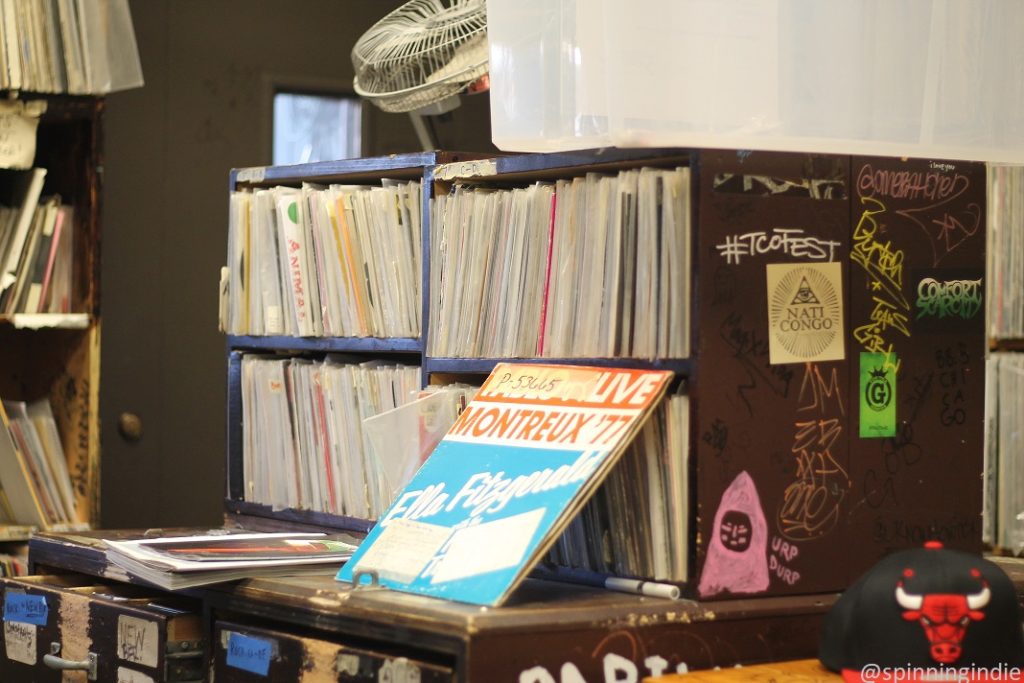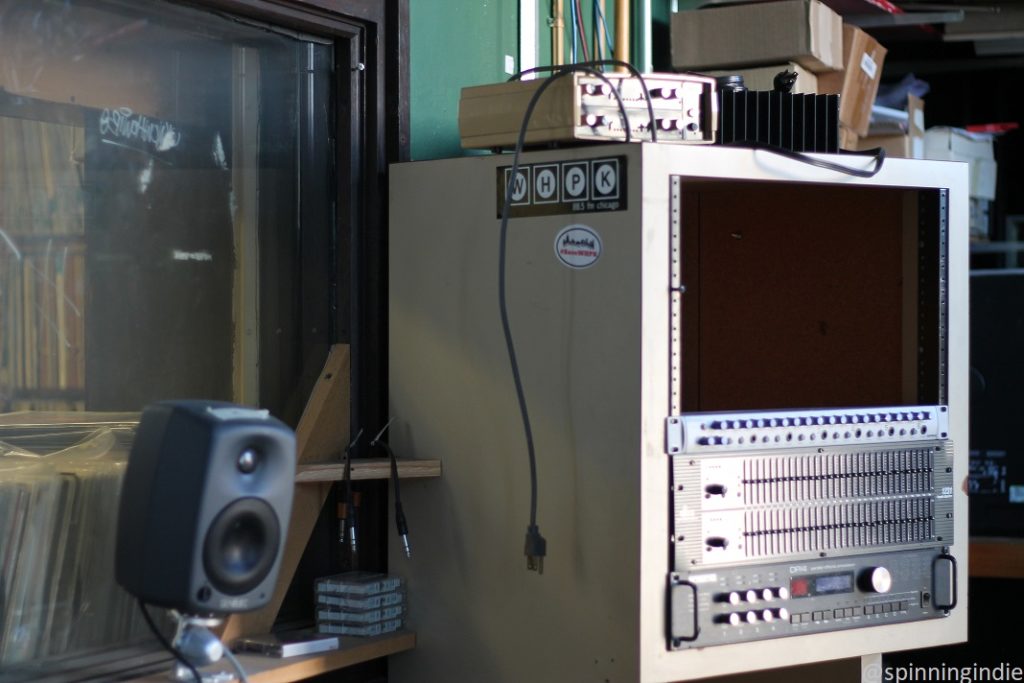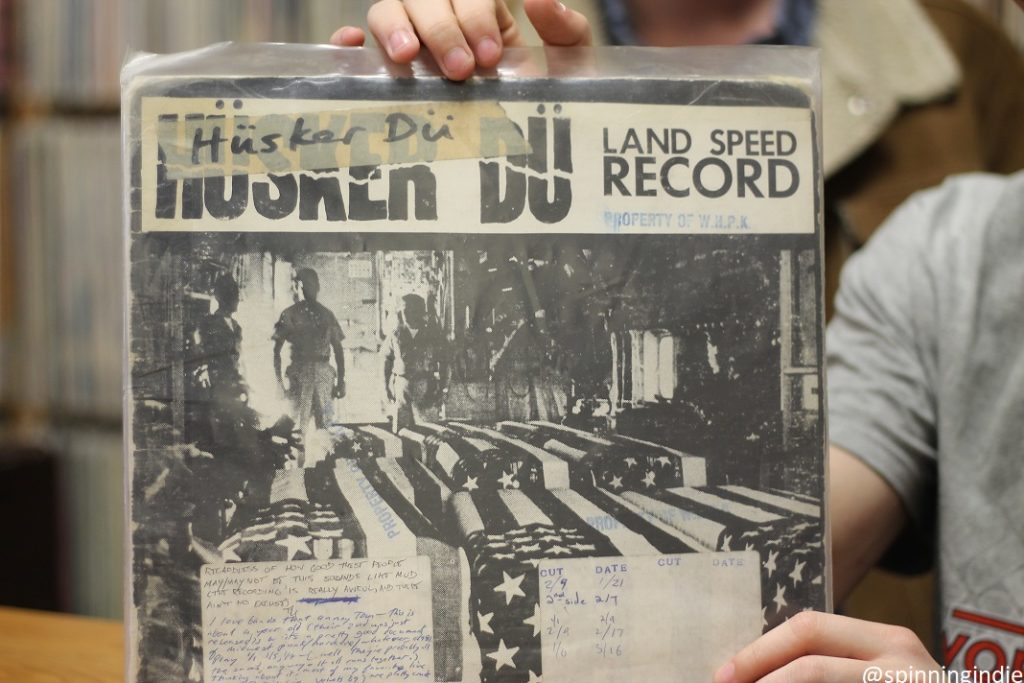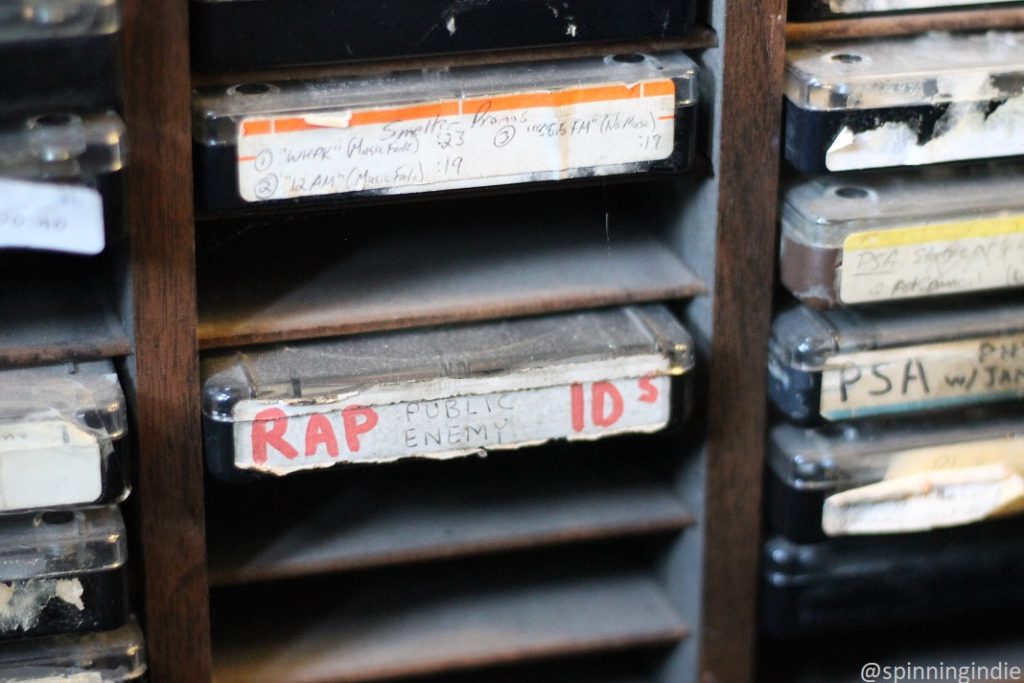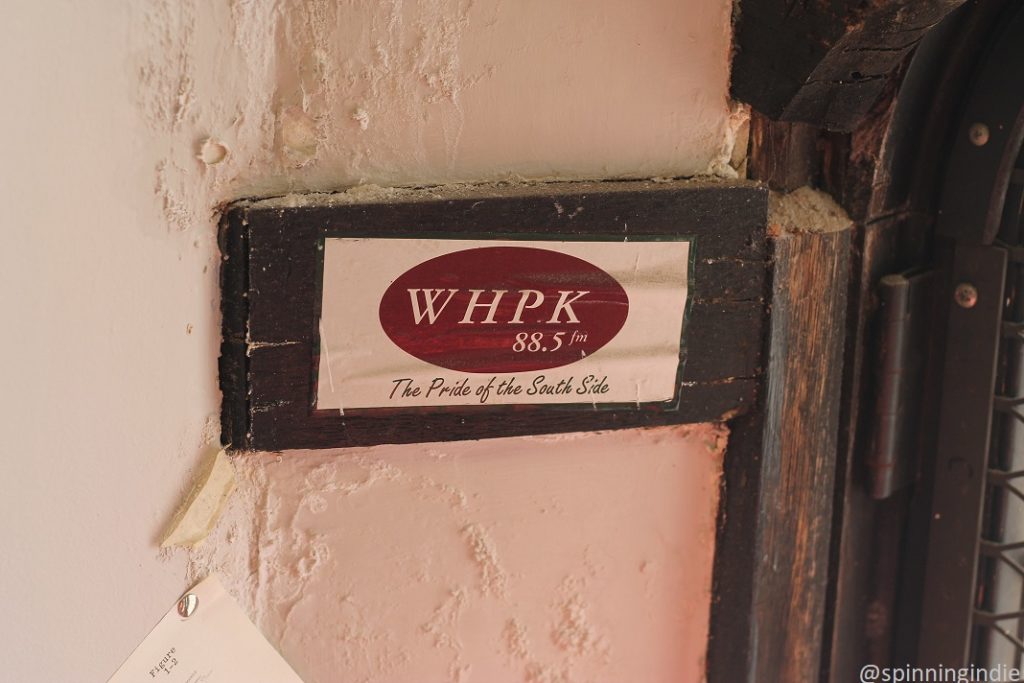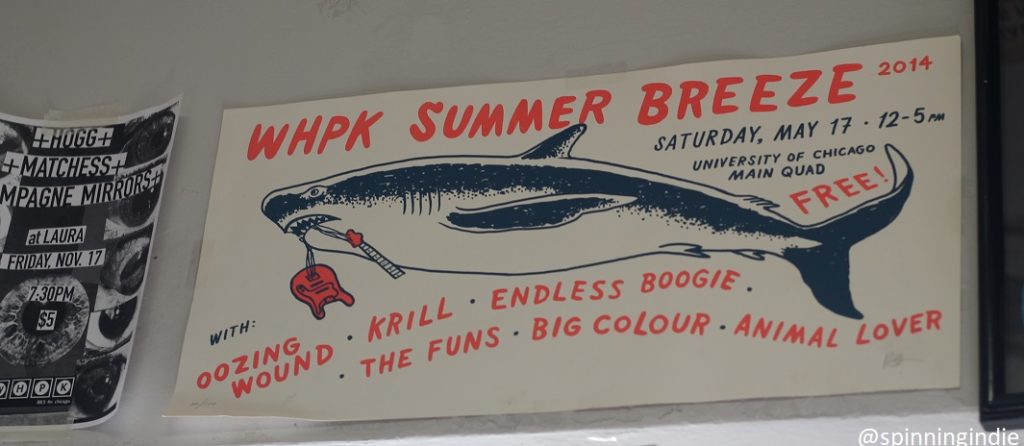I’ve been wanting to see University of Chicago’s college radio station WHPK for quite some time and even had a thwarted trip a few years back when a scheduled tour was canceled due to illness. So, it was with great anticipation that I stopped by on Friday, December 1st for my long-awaited visit. Particularly in light of some recent changes at WHPK in the past few years, I was glad to have a chat with a crew of both students and long-time community volunteers.
Located in the Reynolds Club student center, WHPK occupies an aerie-like space in the Gothic building’s bell tower (Mitchell Tower). After navigating up a steep, winding flight of wooden stairs, one arrives at its cozy home. Station Manager Ethan Weinstein greeted me and introduced me to a big group of colleagues, ranging from long-time volunteers to newer student DJs. During our wide-ranging conversation, we touched on some of the latest challenges at the station, including a ban on late-night programming, a requirement for community DJs to have background checks, and the station’s two month closure in 2016 after the discovery of a few dead bed bugs in the music library.
Community DJ and University of Chicago alumna Marta Nicholas has had the longest relationship with the school and the station and recalls visiting friends at WHPK’s predecessor station in the 1950s: WUCB. She also shared with me details about the even longer radio history at University of Chicago, which dates back to the formation of a “Radio Office” in 1922. By 1931, a radio production featuring professors called “The University of Chicago Round Table,” was being produced out of Mitchell Tower and it eventually became syndicated nationally over NBC. Student radio started in 1945 with the establishment of AM carrier current radio station WUCB. Although it began in the basement of Burton-Judson Courts (check out a 1953 WUCB letter here), it moved to Mitchell Tower in 1959.
By 1968, WHPK (I was told that the call letters are a reference to the Hyde Park-Kenwood neighborhood) had launched over FM, originally at 88.3 FM and then moving to 88.5 FM in 1985. In the 1970s, Nicholas officially joined WHPK and has been doing an international music show since that time.
Today, WHPK attracts around 70 participants, including student and non-student volunteer show hosts and DJs. The compact station space includes a music library that overlooks the on-air studio on one side and a long and narrow production studio on the other (which has windows facing the street). I was told that in the olden days, the current production studio served as the on-air studio. Just outside the on-air studio is a bathroom, which someone joked was the fantasy character Shrek’s, likely because of its fantastical, medieval-looking wooden door. Down the hall there is a two-room WHPK office full of music-to-be-reviewed, historical ephemera, file cabinets, and seating.
Although we spent much of the visit chatting in the office, I could have whiled away several hours in the packed music-library. LPs filled shelves that extended from the floor to the ceiling and a rolling wooden library ladder allowed for access to the uppermost titles.
A graffiti-filled table was in the center of the room and I smiled upon spying the numerous anti-disco rants scrawled on its plastic surface. When I asked if it had been there for a long time, I was told that it wasn’t that old and that a current DJ is the one with a beef against disco music. It amused me that a popular 1970s-era lament (“disco sucks”) seems to have been resurrected so many decades later.
Having read about some challenges at WHPK over the past few years, I was eager to get some perspective from both students and community members. Former Station Manager Zach Yost (the Rock Format Chief at the time of my visit) recounted that during a seven month period, several things happened at the station that led to some hard feelings among both students and community volunteers.
Yost explained that “a whole slew of administrative changes [were] implemented…about pretty much the same time as we were running into facilities issues with the bed bugs. That kind of led to some weird overlapping.” These policy changes included a new requirement that WHPK volunteers who were not affiliated with the university (not students, staff or faculty) would have to submit to a background check. With DJs already miffed about that, the presence of a few dead bed bugs in the WHPK music library led to a station closure and requirement that DJs agree to have their homes inspected for pests. Following the home inspections, WHPK got another blow, when they were informed that they could no longer have live radio shows 24 hours a day. According to Yost, “There was no specific incident that seemed to prompt it and it was just sort of, well now, since we’ve been closed for so long, we feel like this is the best time to implement this policy and from here on out, this is how we’re going to be operating.”
Following this policy change, WHPK is able to have live DJs and hosts in the studio during the “normal” hours for the building: from 7am to midnight during the week and from 8am or 9am on the weekends. Since the station doesn’t have an automation system, that means that WHPK is off the air from at least midnight to 7am every day. Participants told me that they hope this policy will change in the future, but they have heard that it’s unlikely that hours will expand if the station remains in its current location. In regards to the operation of the radio station, this change means not only a reduction in the number of DJs and programs, but also in the loss of the long-time tradition of graveyard shifts for newer DJs.
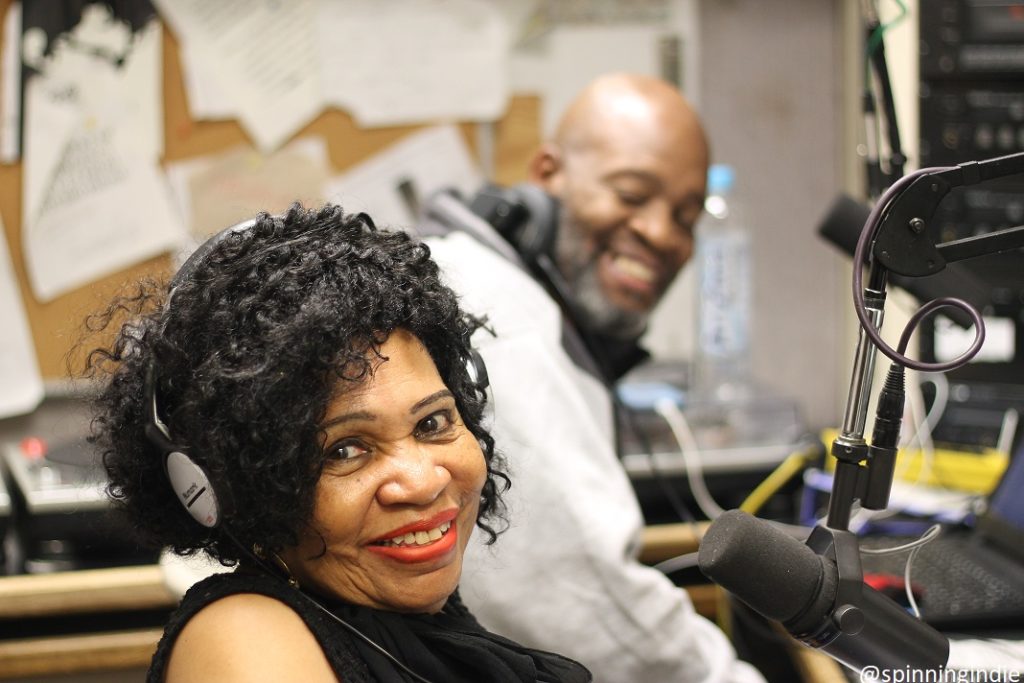
WHPK’s “King George” Smith and his co-host Hattie May the Blues Lady of the “TGIF Blues” show in the studio. Photo: J. Waits
Despite these setbacks, WHPKers expressed enthusiasm about the station and particularly about its role in building connections between the campus and the community. Weinstein explained, “I think it’s a thrill and a pleasure to be able to take on the responsibility of administrating this weird, proud, wonderful, sort of eclectic community infrastructural enterprise that can operate as like a bridge between the town and the gown…Or from the gown to the town, necessarily; since we are a terrestrial FM radio station, our audience is the immediate surrounding area. I think it’s a privilege to be able to serve the people of Hyde Park and the people of the South Side of Chicago.”
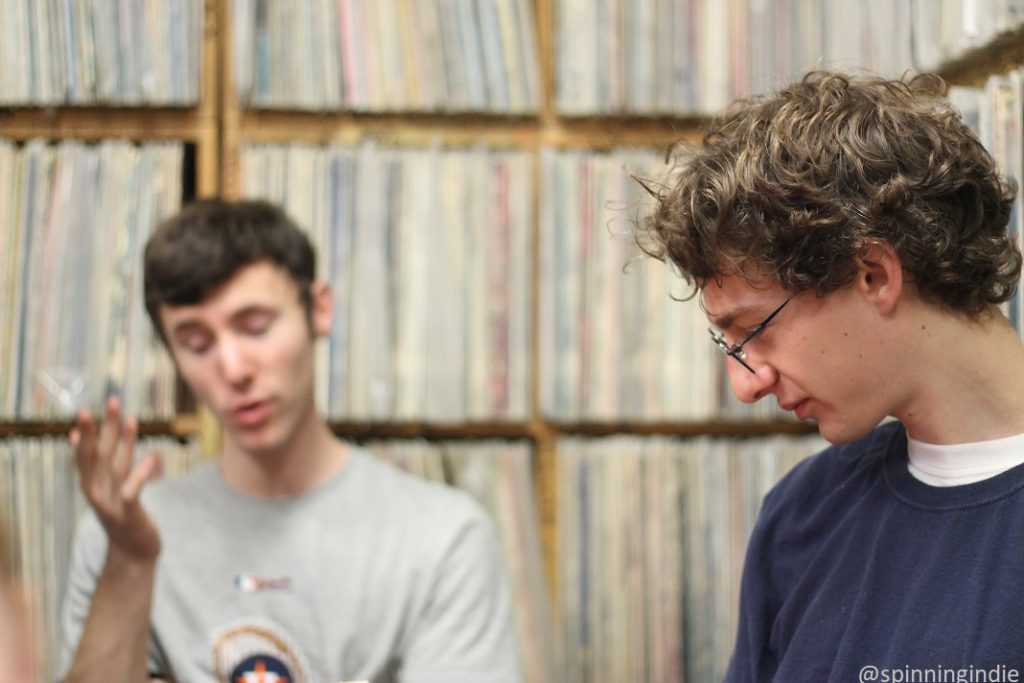
WHPK Co-Music Director Eli Winter and Station Manager Ethan Weinstein in WHPK record library. Photo: J. Waits
Yost eloquently conveyed some of the more ephemeral aspects of radio that make it so alluring for both participants and listeners. “I think there’s something magical about being able to connect with people wherever they are through this strange disembodied medium…if for an hour a week to have people welcome you into their cars or homes or just head spaces, because they want to hear what you’re playing…It’s humbling and it’s exciting…” he opined.
Both students and community DJs expressed pride in WHPK’s role in Chicago music history, sharing lore that the station has played a part in the local hip hop and noise scenes and that it may have been the first station in Chicago with a rap music show in 1984. A 2011 piece on the University of Chicago website outlines the station’s role in hip hop history, stating:
The first station to play hip hop in Chicago in the mid-1980s, WHPK played a pioneering role in the Chicago rap scene, drawing attention to the then-burgeoning genre. Aspiring artists—some future superstars—flocked to the third-floor Reynolds Club tower, waiting for hours to bring in their demo tapes or even perform on air.
In his 2011 memoir, One Day It’ll All Make Sense, the artist Common describes how in the late 1980s, he and his rap trio C.D.R. camped outside on 57th Street, until their music was played.
A 1996 rap battle at WHPK between Common and Kanye West is now legendary, as it is another moment when the college radio station was at the center of hip hop music history. Rap is still a part of the WHPK schedule, with shows three nights a week. Other genres represented at WHPK include rock (weekday mornings), classical and many flavors of international music (weekday afternoons), jazz (evenings, plus “legendary” jazz on the weekends, including Sunday mornings), folk, and electronic music (weekday mornings). Public affairs programming also airs on weekday afternoons and a live in-studio music show, Pure Hype, runs on Friday nights.
as far as the noise scene goes: Radio Dada, Tuesday 10pm-12am, technically incorporated under ‘rock,’ is a now I think ~decade-long tradition that involves WHPK DJs spinning records backwards, layering sludgecore with sound effects, reciting incantations on air, choreographing elaborate sound-systems, ‘playing the studio,’ and frightening away all listeners under the age of 99 in the greater South Side of Chicagoland area (plus worldwide on the web). It’s the closest we get to avant-garde, also the closest we get to insanity — though somewhat regularly in the past we have had noise artists play live in the studio during Pure Hype.”
As far as the station at large; the remainder of the academic year is going to be hectic for the University of Chicago college radio station. Having just celebrated its 50th anniversary over FM with a birthday bash last month, WHPK is now planning for its annual “Summer Breeze concert on the afternoon of May 12.
Thanks so much to everyone at WHPK for the fantastic visit and thoughtful conversations. This is my 143rd radio station tour report, with more on the way from visits in Washington, D.C. and California. My most recent field trips are located on Radio Survivor and a full list of all my station tour reports is archived on Spinning Indie.

